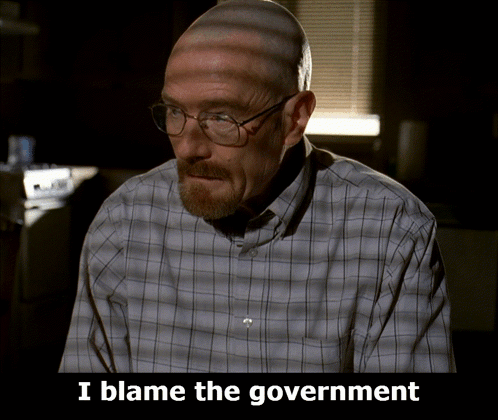The Basics
Upon reading Frederic Bastiat's "The Government" and "The Law", we reach many interesting conclusions on the role that the government/law has on each of us. Bastiat proposes the law exists for the exclusive reason to defend the right of each citizen's life, liberty, and property. All other laws go beyond the scope of what is just and leads to governments "legal plunder" of the citizen and has no right to exist.
Redistribution of Wealth
Who here likes credit cards? Maybe convenient at times, but largely a pox on society these days. It is rare to go into a store and pay with paper money, but why would you, when a little plastic card goes everywhere with you and keeps you from having pockets full of jingly but largely useless coins?
Regardless, one reason why these plastic cards are a net negative to society is in how they operate. Every time you swipe a card, the vendor gets charged a percentage of the card, often 3%. These vendors tend to simply absorb that 3% and lose out on the profit they could have had if someone had have paid with cash. This is a predatory and unsustainable system. Think about it. You swipe your card for $1, and the vendor loses 3%. Then that money goes into their account and they use it to pay an employee or themselves, and so they swipe it to buy something they need. That vendor then eats the 3% for. This next vendor repeats the cycle, over and over and over again until the credit card companies are rich, and everyone else is worse off as their dollars don't go as far because some is always being skimmed off the top.

For me, this is the analogy I think of when Bastiat speaks of the government. According to him, it only knows how to take. It takes a little here, and a little there. Sometimes it just disappears and you never notice it is gone. Over and over and over again until everyone is worse off, regardless of who is getting the money. A never-ending cycle of decreased wealth and property for all. It never stops, and in the end, everyone is made worse off except for those who administrate and are collecting the money.
Like a Kid in a Candy Store
Another insight of Bastiat is that he highlights the inevitable end that all governments face. As the government holds the power to make law, if they chose to abuse that power even minutely, issues arise. In 'The Government' Bastiat speaking about governments and their tendencies states "It will multiply the number of its agents; it will enlarge the circle of its privileges; it will end by appropriating a ruinous proportion". The simple conclusion is that once people are given power to govern that goes beyond the defense of life, liberty, and property they have no reason to keep doing that. Their life, liberty, and property are secure, so why should yours matter?
While there are good politicians out there, I think that Bastiat's quote rings very true today. The number of government employees continues to rise, even though most people are dissatisfied with the government. The government makes efforts to maintain its power and fights to the end whenever a bureaucratic organization is terminated. Regardless of what they do, each and every one of those agencies increases the cost to the citizen. Every one has dozens of costs that ultimately do nothing but keep the organization operational, on top of whatever costs are incurred by that organizations specific mission.
To me, this is like an unsupervised kid in a candy store. At least like what a 6 year old unsupervised me would do in a candy store. If that were the case, I would eat, and eat, and eat, and eat. I would not stop. I would invite my friends so they too could eat, providing that they left any sour gummy worms alone. At some point, I would get sick, but after a brief toilet trip I would resume. I likely would choose not to leave, either. Why would I? If I had control of the candy shop, and candy is good, then eat I would. I would eat until I was so full that I burst in "Ruinous Proportion", as Bastiat puts it.
The moral, at least according to Bastiat, is that in such a way as a kid in a candy store, law beyond the simplest defense of life, liberty, and property is unsustainable. As unfounded laws get added, the government grows and grows, and takes and takes, until it becomes so large that it literally can not be sustained. All of this comes at the expense of the citizens who are forced into funding the whole endeavor. This "Legal Plunder", as Bastiat puts it, is no way to live. Ideally, we would all reach a level of society in which there is no plunder, and we prosper with each other instead of in spite of each other.
Just, or Legal?
At the end of the day, what do we do? When the government has the power to enforce its legalities through violence, how do the people gain justice? Ultimately, the only answer is to come together as a society and correct these issues. No one person can or will make a large enough of a difference to matter. So if you do agree or disagree with Bastiat's philosophies, please let me know. I would love to hear your perspectives on these matters at hand.